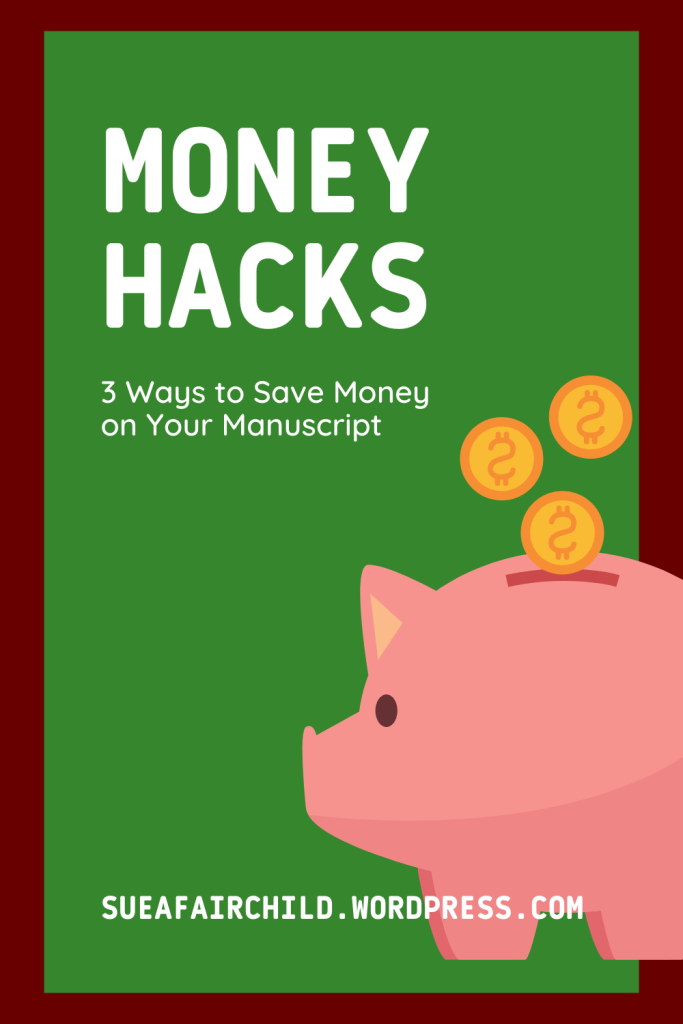One of the number one things I hear from authors looking to publish a novel is, “Why does it cost so much?” or “What can I do to save money when publishing?” Let’s face it, most writers use self-publishing because they think it’s the faster, cheaper way. (It’s not.) But there are ways you can save money when publishing your next book.
First, let’s be clear. It does take money to publish a novel. You’ll spend money on any of the following:
- A writing program like Word or Scrivener
- Research tools
- A professional editor
- A professional cover designer
- A professional headshot
- Marketing and publicity
And once you’ve spent upwards of a year writing and spending some money on that perfect novel, you want to get it out to the public ASAP and with minimal effort. So here are three ways you can both speed up the process and get some help for free.
- Join a critique group or find a critique partner. I know, I know … “There are none in my area!” So what? Do you realize how many online critique groups there are? Most of them are free to join and free to obtain advice from. I manage “Writers Helping Writers” on Facebook, for one example. In our group, writers of all levels share information about writing, publishing, marketing, and even writer’s block. We encourage one another and some folks have even put together subgroups of critique partners. There are tons more on FB and other platforms, just do a bit of searching to find the one that works best for you. (TIP: Look for one that doesn’t allow promotions. Those that DO allow promotion in their groups tend to be ONLY about promotion.) (Also visit Word Weavers International* and see if there is a local group in your area. *Christian based.)
- Attend writing conferences. Okay, so writing conferences do take money to attend. However, since COVID started a lot of groups have met online at reduced rates. If you can afford to go to an in-person conference (might I suggest the St. Davids Christian Writers’ Conference, Asheville Writers’ Conference, or the Montrose Christian Writer’s Conference?), look for one that will give you access to an editor or agent geared toward your genre. Then, during the conference, meet with that individual. Pick their brain, if you can. Sit with them during a meal and chat. CONNECT. Often, this is the fastest and best way to get to the top of the slush pile with a publisher—by knowing the publisher. In addition, you will learn from other industry professionals and fellow writers about what works and doesn’t. And you can have access to these deep wells of knowledge for just the price of admission to the conference.
- Educate yourself. Even if you can’t get to a writing conference to learn all the best writing techniques, you can research things online and start to hone your writing skills. Look for highly esteemed industry professionals first. In the Christian market, look for any advice from Bob Hostetler, Steve Laube, Jerry Jenkins, Eva Marie Everson, Edie Melson, Athena Dean Holz, Deb Haggerty, Edwina Perkins, and anyone they are associated with. Grab a copy of Stephen King’s “On Writing” and read it again and again. Check out “Writing the Breakout Novel: Insider Advice for Taking Your Fiction to the Next Level” by Donald Maass or “On Writing Well: An Informal Guide to Writing Nonfiction” by William Zinsser. Ask other authors what books they read that helped (there are a ton!) and then head to your favorite bookstore or library to check them out. Take workshops when you can. Attend conferences. Sit at the feet of people who have been in the industry for a longtime, if you can. Writing a book isn’t just sitting down at a keyboard and typing … you can and should start learning about the process too. (And probably first.)
If you do these three things, when it comes time to editing and publishing your novel, it will cost less because you will have learned how to show not tell, how to set the pacing in your novel, what “good character development” means, and what tropes are most prevalent in your genre. (Not sure what a trope is? You should educate yourself on that!) You will also know what not to do (so you don’t waste your time) and what to do to get your book out into the great big world.
And guess what else? If you do all of these things, you’ll probably put out such a great book that tons of people will buy it and read it and you’ll be a huge success. And then you’ll have money to write all the other books you want to write!

